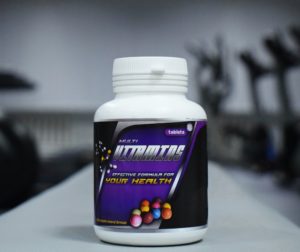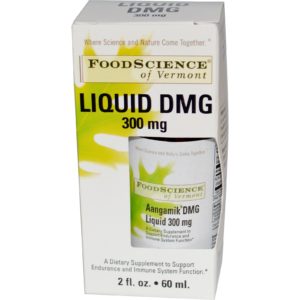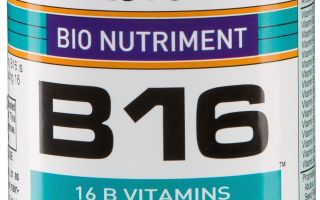Content
- 1 What is DMG or Dimethylglycine
- 2 What does the body need vitamin B16 for?
- 3 What foods contain vitamin B16
- 4 Indications for the use of dimethylglycine
- 5 Contraindications and side effects
- 6 Instructions for the use of Dimethylglycine
- 7 Dimethylglycine for children
- 8 Conclusion
- 9 Reviews of dimethylglycine
Vitamin B16 has gathered a lot of controversy around itself. For a long time, due to its structural features, scientists confused it with pangamic acid. Vitamin is a non-protein amino acid found in plant and animal cells. It plays an important role in metabolic processes.
What is DMG or Dimethylglycine
The second name for vitamin B16 is dimethylglycine or dimethylaminoacetic acid. For convenience, the name was abbreviated to the abbreviation DMG. The vitamin is considered a derivative of glycine. Due to its structure, it is classified as a vitamin-like nutrient. The first information about dimethylglycine appeared in the 40s. In medical practice, the substance began to be used only in the second half of the 60s.
The synthesis of a useful substance partially occurs in the human body. The rest of the dimethylglycine comes from food. After being absorbed into the bloodstream, DMG enters the liver cells. There it is transformed into substances necessary for the body - methionine, sarcosine and glycine. The residual amount of dimethylglycine is excreted from the body through the intestines and kidneys.

What does the body need vitamin B16 for?
Dimethylglycine has a number of essential functions in the human body. In terms of its importance, it is placed between glycine and choline. First of all, it is useful for people suffering from low immunity. Vitamin B16 has a positive effect on the emotional state of a person. In order to increase endurance and start metabolic processes, it is often used by athletes. This beneficial supplement reduces muscle lactic acid levels and helps oxygenate the body's cells.
Other useful properties of DGM include:
- antioxidant action;
- normalization of blood pressure;
- restoring glucose levels in the body;
- prevention of diseases of the organs of vision;
- stimulation of the brain;
- improving lipid metabolism;
- saturation of tissues and cells of the body with building material;
- restoration of the immune system;
- preventing the growth of atherosclerotic plaques;
- prevention of varicose veins;
- slowing down the aging process of cells;
- improvement of cognitive functions.
Women are prescribed vitamin B16 in order to eliminate amenorrhea provoked by stressful situations. Dimethylglycine brings the emotional state back to normal, leveling the menstrual cycle. Vitamin B16 takes an active part in the production of hormones. In addition, it inhibits the onset of aging of the body, which has a positive effect on a woman's appearance.
What foods contain vitamin B16
Dimethylglycine enters the body as part of various foods. In products of plant origin, its concentration is much higher than that of animals. The daily requirement for a substance in an adult varies from 100 to 300 mg.
The main sources of vitamin B16 include:
- any kind of meat;
- chicken eggs;
- pumpkin seeds;
- sauerkraut;
- spinach;
- legumes;
- sesame;
- milk products.
Indications for the use of dimethylglycine
Most often, vitamin B16 is prescribed with a vivid manifestation of vitamin deficiency. It can also be used for the prevention and treatment of various diseases as part of complex therapy. Vitamin is especially beneficial for the elderly. It helps prevent the occurrence of hypertension, heart attacks and atherosclerosis. The beneficial effect on the state of the vascular walls is due to the prevention of the formation of atherosclerotic plaques that can clog the lumen of blood vessels.
Indications for taking dimethylglycine are as follows:
- epilepsy;
- heavy physical and mental stress;
- toxic poisoning of the body;
- cardiovascular diseases;
- neurological disorders;
- cataract;
- increased blood cholesterol;
- chronic fatigue syndrome;
- multiple sclerosis;
- decreased immunity;
- atherosclerosis;
- inflammatory process in the lungs.

Athletes use dimethylglycine to provide oxygen to all vital systems. Taking vitamin B16 significantly increases endurance. This makes your workouts more productive. Together with this, the metabolism of carbohydrates and fats starts. In addition, the vitamin-like substance frees muscle cells from uric acid. That is why dimethylglycine is often added to sports nutrition.
A number of clinical studies have found a positive effect of vitamin B16 on people with epilepsy. Regular intake of the substance into the body significantly reduces the frequency of attacks. This is due to the activation of inhibitory functions in the work of the central nervous system. In addition, the dietary supplement ensures the passage of impulses along the peripheral nerves and helps get rid of movement disorders, which often provoke neuritis and neuropathy. Dimethylaminoacetic acid is thought to be able to reduce the risk of multiple sclerosis.
The antioxidant activity of the vitamin helps to maintain youth. Dimethylglycine protects body cells from the negative effects of external factors. Women use the vitamin to improve the condition of their skin, hair and nails.
With a lack of vitamin B16, the immune system is noticeably weakened. Without objective reasons, a person observes that he gets tired faster. There are characteristic darkening of the eyes and dizziness. Often this condition gradually transforms into depression.
Contraindications and side effects
When used correctly, vitamin B16 is considered safe for health. The list of contraindications is small. These include the following:
- hypersensitivity;
- the period of feeding and bearing the child;
- severe hypertension;
- under seven years of age.
Since the excess vitamin is excreted from the body naturally, it cannot accumulate. Side effects occur only with individual intolerance to dimethylglycine.
In this case, the following symptoms occur:
- stool disturbance and nausea;
- skin rashes;
- itching;
- dizziness and migraine.
If you experience discomfort, you should stop taking vitamin B16. It is also advisable to consult a doctor to determine the cause of the pathological process. With a bright manifestation of an allergic reaction, the use of antihistamines may be required.
Instructions for the use of Dimethylglycine

If vitamin B16 does not enter the body in the required amount with food, specialized medications are prescribed.The scheme of application for each dietary supplement will be different. The daily norm is considered to be 100-300 mg. It directly depends on the level of physical activity. The tablet is taken with meals. The total duration of drug use is two months. After the treatment-and-prophylactic course, you should take a break of at least six months.
According to the instructions for use, it is advisable to take vitamin B16 together with vitamin C. This will increase the antioxidant properties of the biological supplement. The vitamin has no effect on the assimilation of other medicines. Alcoholic beverages should be excluded while taking a vitamin-like substance.
Dimethylglycine for children
For children, drugs containing dimethylglycine are prescribed not only for general strengthening of the body, but also for medicinal purposes. Vitamin effectively copes with neurological disorders. It rid the body of toxic substances that have a destructive effect on neurons.
According to many reviews, dimethylglycine is extremely beneficial for preschool children. It improves concentration and learning ability. While taking the vitamin, the child develops speech skills faster. In addition, the immune system is stimulated, which affects the body's susceptibility to viral and infectious diseases. As a result, the risk of catching a cold is reduced. Sometimes a vitamin supplement is used during an exacerbation of chronic diseases.
Dimethylglycine is often used as part of complex therapy for children with autism. The positive effect is observed through the enhancement of cognitive abilities. The child begins to show interest in the world around him and becomes calmer. The downside to the positive effects of the vitamin is the high risk of developing hyperactivity. To prevent this from happening, dimethylglycine is taken together with folic acid.
Conclusion
Vitamin B16 is good for people of all ages. It improves performance and prevents the development of various diseases. To get the maximum benefit from a vitamin, it is advisable to take it not separately, but in combination with other vitamins.

